Demonstrating Reflective Practice in H&SC: A Report
VerifiedAdded on 2023/01/13
|14
|4497
|64
Report
AI Summary
This report delves into the significance of reflective practice within the health and social care sector, emphasizing its role in professional development. It explores the purpose of reflection and different models and tools used, such as Gibbs' reflective cycle and Kolb's experiential learning model. The report elucidates how practice themes, encompassing law, regulation, and ethical practices, underpin reflection, and it illustrates the interconnectedness between practice themes and performance indicators. Additionally, it outlines methods for gathering evidence of effective reflective practice, including reflective journals and portfolios. The report concludes by reviewing evidence gathered and producing targets for development, underscoring the continuous improvement and self-assessment inherent in health and social care practice.
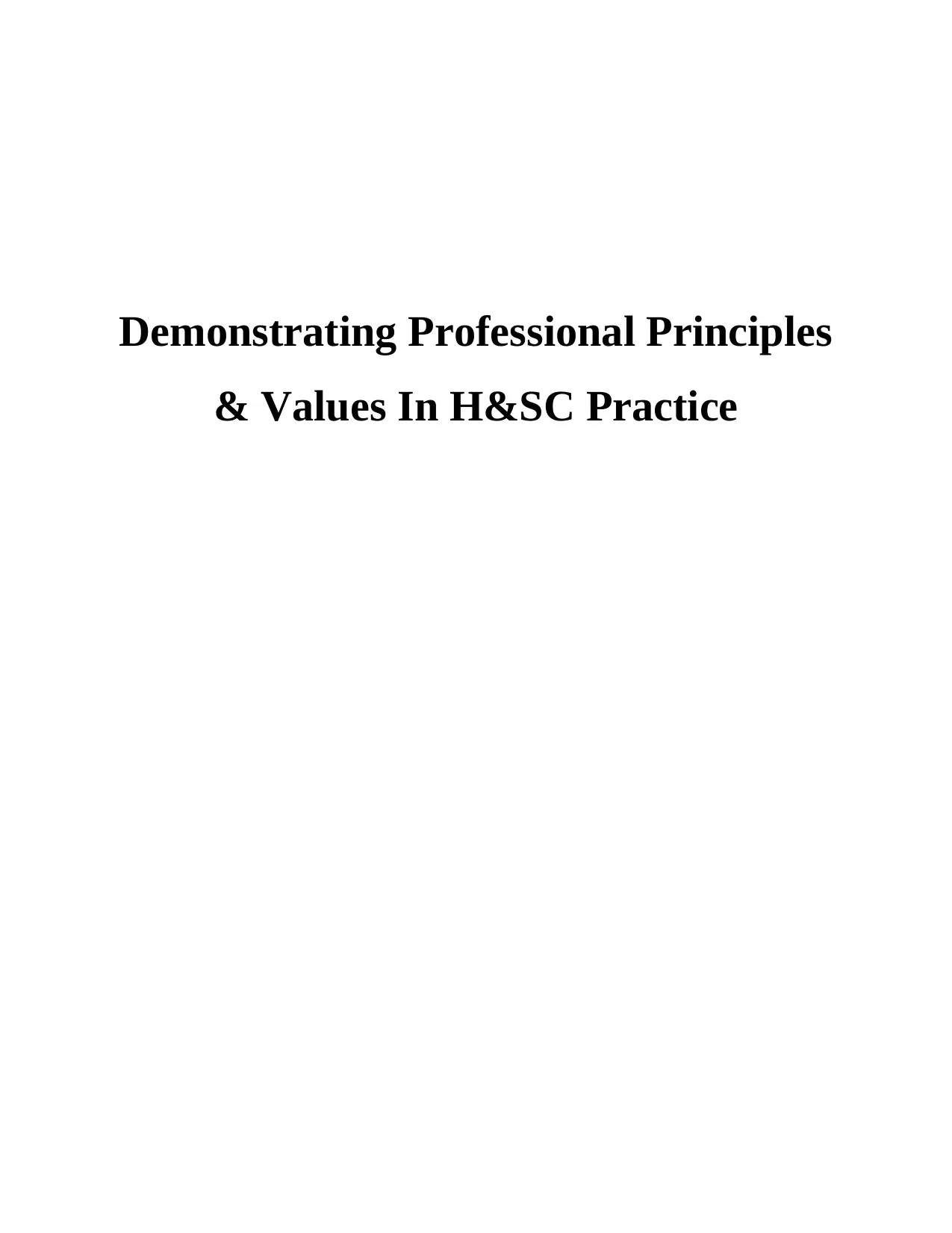
Demonstrating Professional Principles
& Values In H&SC Practice
& Values In H&SC Practice
Paraphrase This Document
Need a fresh take? Get an instant paraphrase of this document with our AI Paraphraser
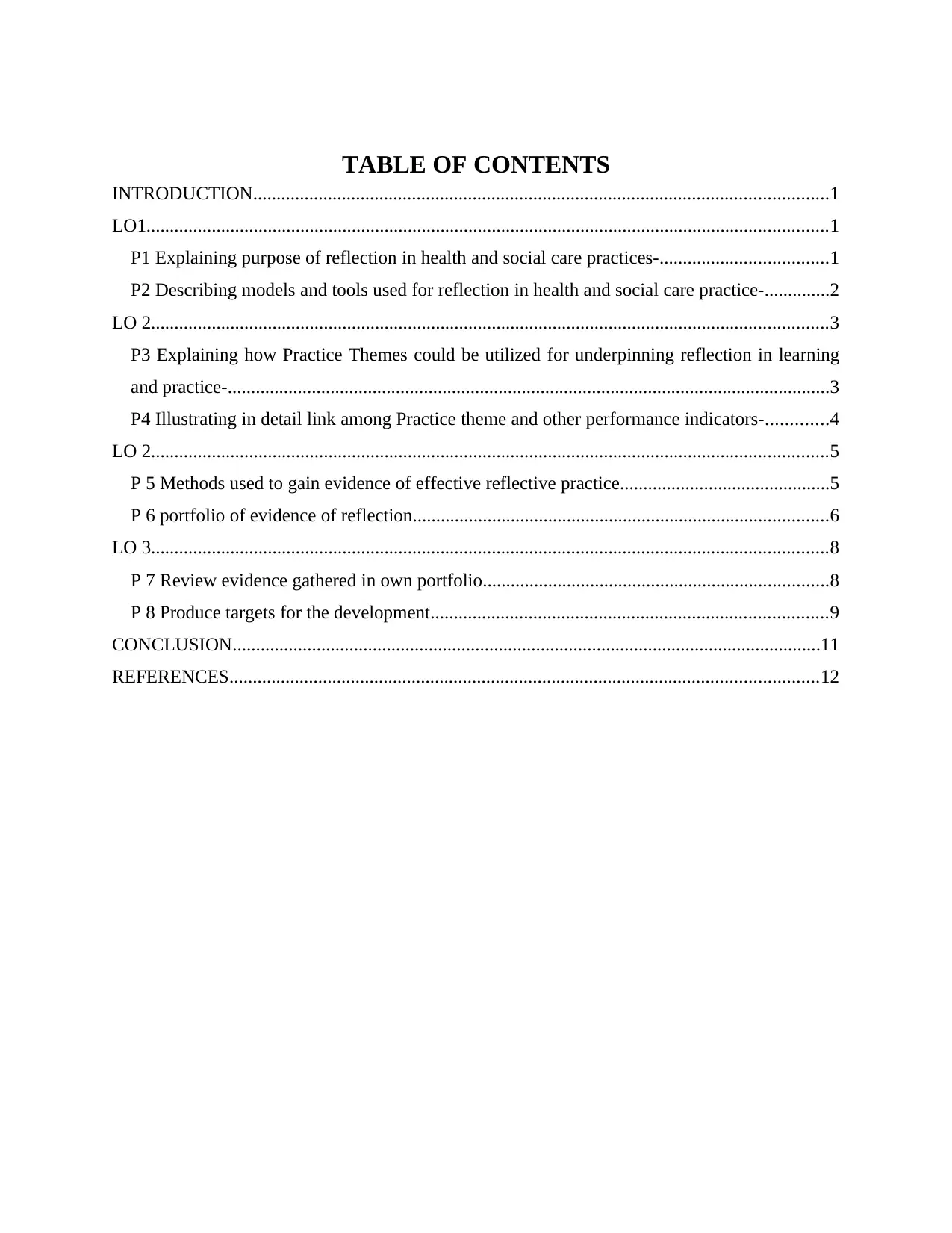
TABLE OF CONTENTS
INTRODUCTION...........................................................................................................................1
LO1..................................................................................................................................................1
P1 Explaining purpose of reflection in health and social care practices-....................................1
P2 Describing models and tools used for reflection in health and social care practice-..............2
LO 2.................................................................................................................................................3
P3 Explaining how Practice Themes could be utilized for underpinning reflection in learning
and practice-.................................................................................................................................3
P4 Illustrating in detail link among Practice theme and other performance indicators-.............4
LO 2.................................................................................................................................................5
P 5 Methods used to gain evidence of effective reflective practice.............................................5
P 6 portfolio of evidence of reflection.........................................................................................6
LO 3.................................................................................................................................................8
P 7 Review evidence gathered in own portfolio..........................................................................8
P 8 Produce targets for the development.....................................................................................9
CONCLUSION..............................................................................................................................11
REFERENCES..............................................................................................................................12
INTRODUCTION...........................................................................................................................1
LO1..................................................................................................................................................1
P1 Explaining purpose of reflection in health and social care practices-....................................1
P2 Describing models and tools used for reflection in health and social care practice-..............2
LO 2.................................................................................................................................................3
P3 Explaining how Practice Themes could be utilized for underpinning reflection in learning
and practice-.................................................................................................................................3
P4 Illustrating in detail link among Practice theme and other performance indicators-.............4
LO 2.................................................................................................................................................5
P 5 Methods used to gain evidence of effective reflective practice.............................................5
P 6 portfolio of evidence of reflection.........................................................................................6
LO 3.................................................................................................................................................8
P 7 Review evidence gathered in own portfolio..........................................................................8
P 8 Produce targets for the development.....................................................................................9
CONCLUSION..............................................................................................................................11
REFERENCES..............................................................................................................................12
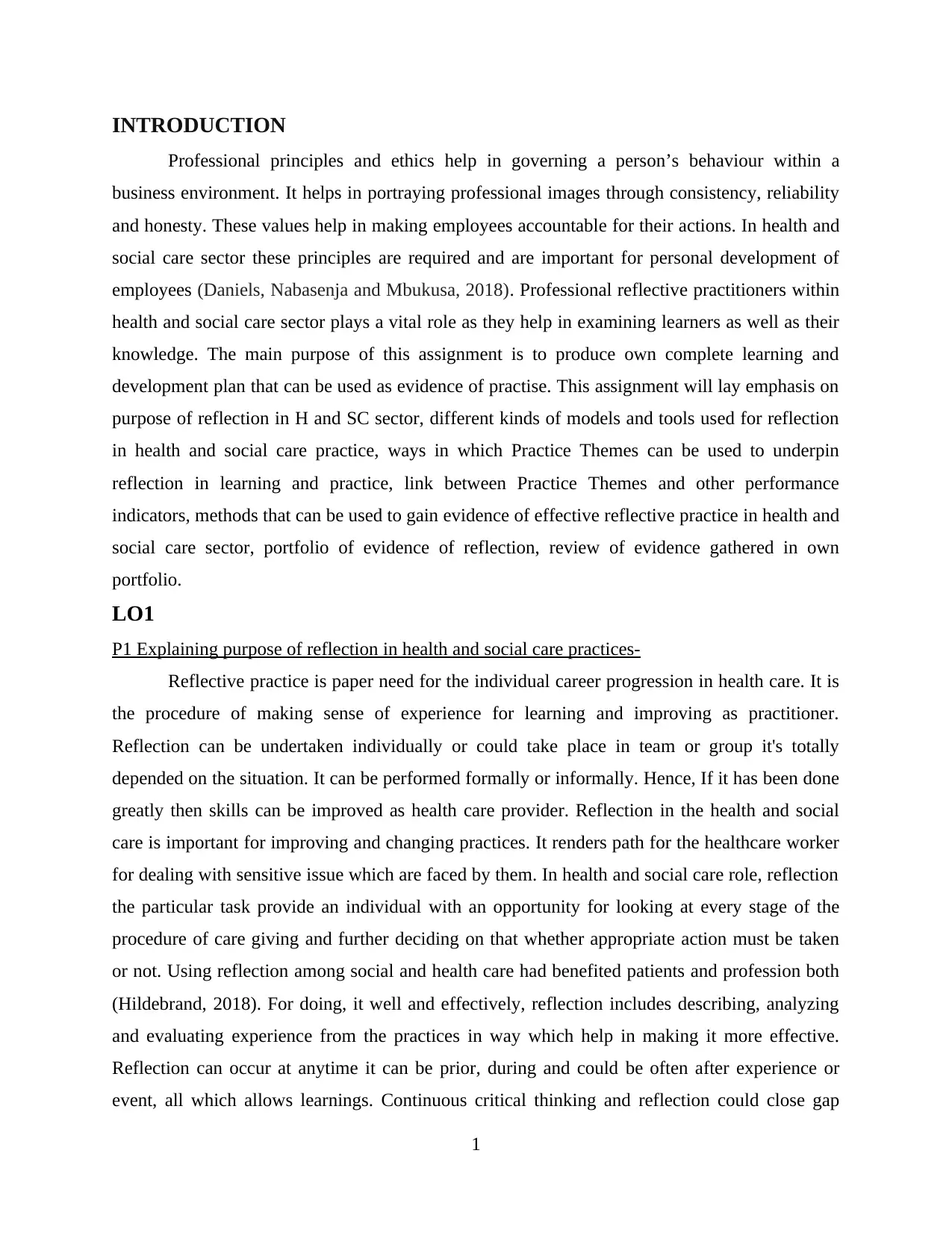
INTRODUCTION
Professional principles and ethics help in governing a person’s behaviour within a
business environment. It helps in portraying professional images through consistency, reliability
and honesty. These values help in making employees accountable for their actions. In health and
social care sector these principles are required and are important for personal development of
employees (Daniels, Nabasenja and Mbukusa, 2018). Professional reflective practitioners within
health and social care sector plays a vital role as they help in examining learners as well as their
knowledge. The main purpose of this assignment is to produce own complete learning and
development plan that can be used as evidence of practise. This assignment will lay emphasis on
purpose of reflection in H and SC sector, different kinds of models and tools used for reflection
in health and social care practice, ways in which Practice Themes can be used to underpin
reflection in learning and practice, link between Practice Themes and other performance
indicators, methods that can be used to gain evidence of effective reflective practice in health and
social care sector, portfolio of evidence of reflection, review of evidence gathered in own
portfolio.
LO1
P1 Explaining purpose of reflection in health and social care practices-
Reflective practice is paper need for the individual career progression in health care. It is
the procedure of making sense of experience for learning and improving as practitioner.
Reflection can be undertaken individually or could take place in team or group it's totally
depended on the situation. It can be performed formally or informally. Hence, If it has been done
greatly then skills can be improved as health care provider. Reflection in the health and social
care is important for improving and changing practices. It renders path for the healthcare worker
for dealing with sensitive issue which are faced by them. In health and social care role, reflection
the particular task provide an individual with an opportunity for looking at every stage of the
procedure of care giving and further deciding on that whether appropriate action must be taken
or not. Using reflection among social and health care had benefited patients and profession both
(Hildebrand, 2018). For doing, it well and effectively, reflection includes describing, analyzing
and evaluating experience from the practices in way which help in making it more effective.
Reflection can occur at anytime it can be prior, during and could be often after experience or
event, all which allows learnings. Continuous critical thinking and reflection could close gap
1
Professional principles and ethics help in governing a person’s behaviour within a
business environment. It helps in portraying professional images through consistency, reliability
and honesty. These values help in making employees accountable for their actions. In health and
social care sector these principles are required and are important for personal development of
employees (Daniels, Nabasenja and Mbukusa, 2018). Professional reflective practitioners within
health and social care sector plays a vital role as they help in examining learners as well as their
knowledge. The main purpose of this assignment is to produce own complete learning and
development plan that can be used as evidence of practise. This assignment will lay emphasis on
purpose of reflection in H and SC sector, different kinds of models and tools used for reflection
in health and social care practice, ways in which Practice Themes can be used to underpin
reflection in learning and practice, link between Practice Themes and other performance
indicators, methods that can be used to gain evidence of effective reflective practice in health and
social care sector, portfolio of evidence of reflection, review of evidence gathered in own
portfolio.
LO1
P1 Explaining purpose of reflection in health and social care practices-
Reflective practice is paper need for the individual career progression in health care. It is
the procedure of making sense of experience for learning and improving as practitioner.
Reflection can be undertaken individually or could take place in team or group it's totally
depended on the situation. It can be performed formally or informally. Hence, If it has been done
greatly then skills can be improved as health care provider. Reflection in the health and social
care is important for improving and changing practices. It renders path for the healthcare worker
for dealing with sensitive issue which are faced by them. In health and social care role, reflection
the particular task provide an individual with an opportunity for looking at every stage of the
procedure of care giving and further deciding on that whether appropriate action must be taken
or not. Using reflection among social and health care had benefited patients and profession both
(Hildebrand, 2018). For doing, it well and effectively, reflection includes describing, analyzing
and evaluating experience from the practices in way which help in making it more effective.
Reflection can occur at anytime it can be prior, during and could be often after experience or
event, all which allows learnings. Continuous critical thinking and reflection could close gap
1
⊘ This is a preview!⊘
Do you want full access?
Subscribe today to unlock all pages.

Trusted by 1+ million students worldwide
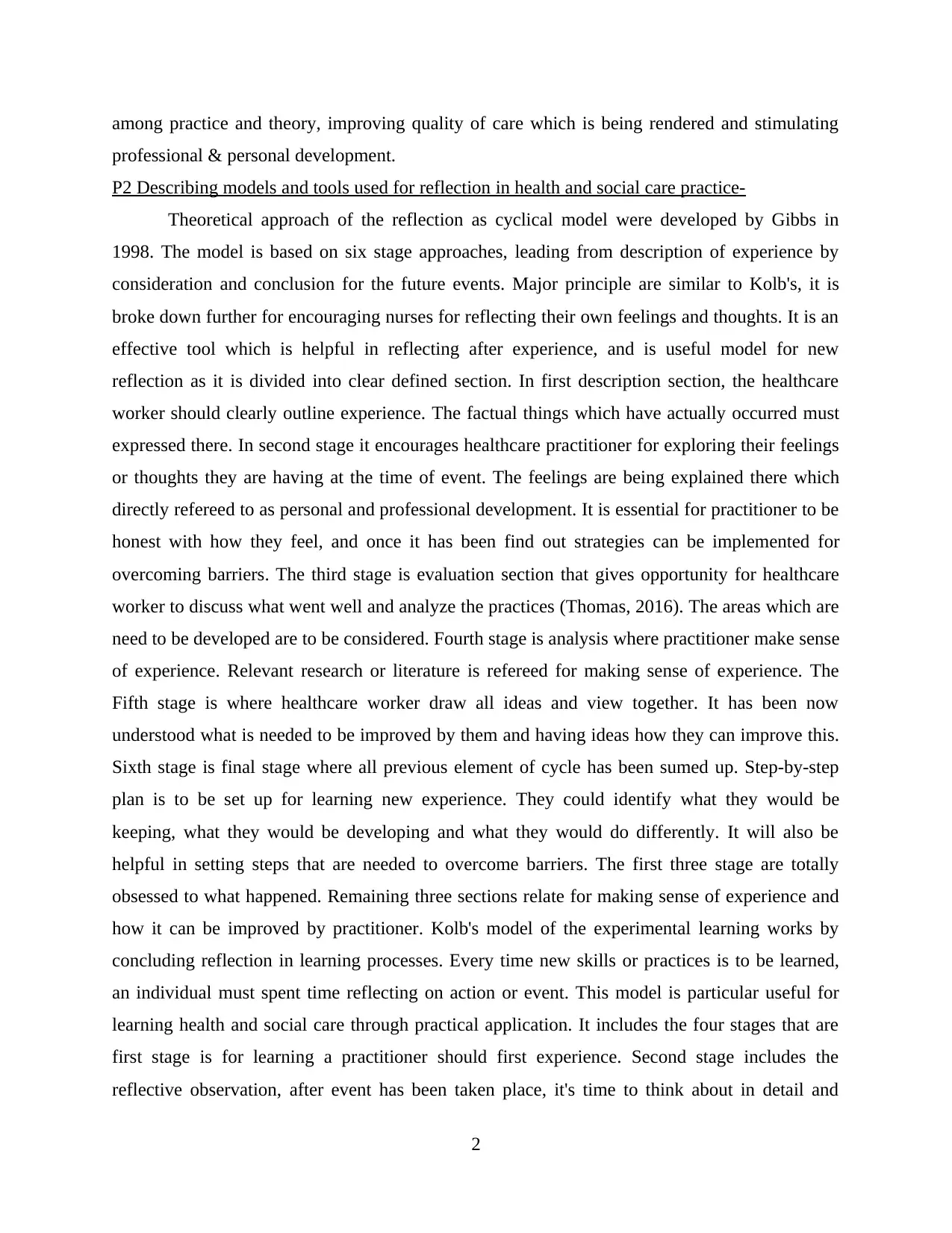
among practice and theory, improving quality of care which is being rendered and stimulating
professional & personal development.
P2 Describing models and tools used for reflection in health and social care practice-
Theoretical approach of the reflection as cyclical model were developed by Gibbs in
1998. The model is based on six stage approaches, leading from description of experience by
consideration and conclusion for the future events. Major principle are similar to Kolb's, it is
broke down further for encouraging nurses for reflecting their own feelings and thoughts. It is an
effective tool which is helpful in reflecting after experience, and is useful model for new
reflection as it is divided into clear defined section. In first description section, the healthcare
worker should clearly outline experience. The factual things which have actually occurred must
expressed there. In second stage it encourages healthcare practitioner for exploring their feelings
or thoughts they are having at the time of event. The feelings are being explained there which
directly refereed to as personal and professional development. It is essential for practitioner to be
honest with how they feel, and once it has been find out strategies can be implemented for
overcoming barriers. The third stage is evaluation section that gives opportunity for healthcare
worker to discuss what went well and analyze the practices (Thomas, 2016). The areas which are
need to be developed are to be considered. Fourth stage is analysis where practitioner make sense
of experience. Relevant research or literature is refereed for making sense of experience. The
Fifth stage is where healthcare worker draw all ideas and view together. It has been now
understood what is needed to be improved by them and having ideas how they can improve this.
Sixth stage is final stage where all previous element of cycle has been sumed up. Step-by-step
plan is to be set up for learning new experience. They could identify what they would be
keeping, what they would be developing and what they would do differently. It will also be
helpful in setting steps that are needed to overcome barriers. The first three stage are totally
obsessed to what happened. Remaining three sections relate for making sense of experience and
how it can be improved by practitioner. Kolb's model of the experimental learning works by
concluding reflection in learning processes. Every time new skills or practices is to be learned,
an individual must spent time reflecting on action or event. This model is particular useful for
learning health and social care through practical application. It includes the four stages that are
first stage is for learning a practitioner should first experience. Second stage includes the
reflective observation, after event has been taken place, it's time to think about in detail and
2
professional & personal development.
P2 Describing models and tools used for reflection in health and social care practice-
Theoretical approach of the reflection as cyclical model were developed by Gibbs in
1998. The model is based on six stage approaches, leading from description of experience by
consideration and conclusion for the future events. Major principle are similar to Kolb's, it is
broke down further for encouraging nurses for reflecting their own feelings and thoughts. It is an
effective tool which is helpful in reflecting after experience, and is useful model for new
reflection as it is divided into clear defined section. In first description section, the healthcare
worker should clearly outline experience. The factual things which have actually occurred must
expressed there. In second stage it encourages healthcare practitioner for exploring their feelings
or thoughts they are having at the time of event. The feelings are being explained there which
directly refereed to as personal and professional development. It is essential for practitioner to be
honest with how they feel, and once it has been find out strategies can be implemented for
overcoming barriers. The third stage is evaluation section that gives opportunity for healthcare
worker to discuss what went well and analyze the practices (Thomas, 2016). The areas which are
need to be developed are to be considered. Fourth stage is analysis where practitioner make sense
of experience. Relevant research or literature is refereed for making sense of experience. The
Fifth stage is where healthcare worker draw all ideas and view together. It has been now
understood what is needed to be improved by them and having ideas how they can improve this.
Sixth stage is final stage where all previous element of cycle has been sumed up. Step-by-step
plan is to be set up for learning new experience. They could identify what they would be
keeping, what they would be developing and what they would do differently. It will also be
helpful in setting steps that are needed to overcome barriers. The first three stage are totally
obsessed to what happened. Remaining three sections relate for making sense of experience and
how it can be improved by practitioner. Kolb's model of the experimental learning works by
concluding reflection in learning processes. Every time new skills or practices is to be learned,
an individual must spent time reflecting on action or event. This model is particular useful for
learning health and social care through practical application. It includes the four stages that are
first stage is for learning a practitioner should first experience. Second stage includes the
reflective observation, after event has been taken place, it's time to think about in detail and
2
Paraphrase This Document
Need a fresh take? Get an instant paraphrase of this document with our AI Paraphraser
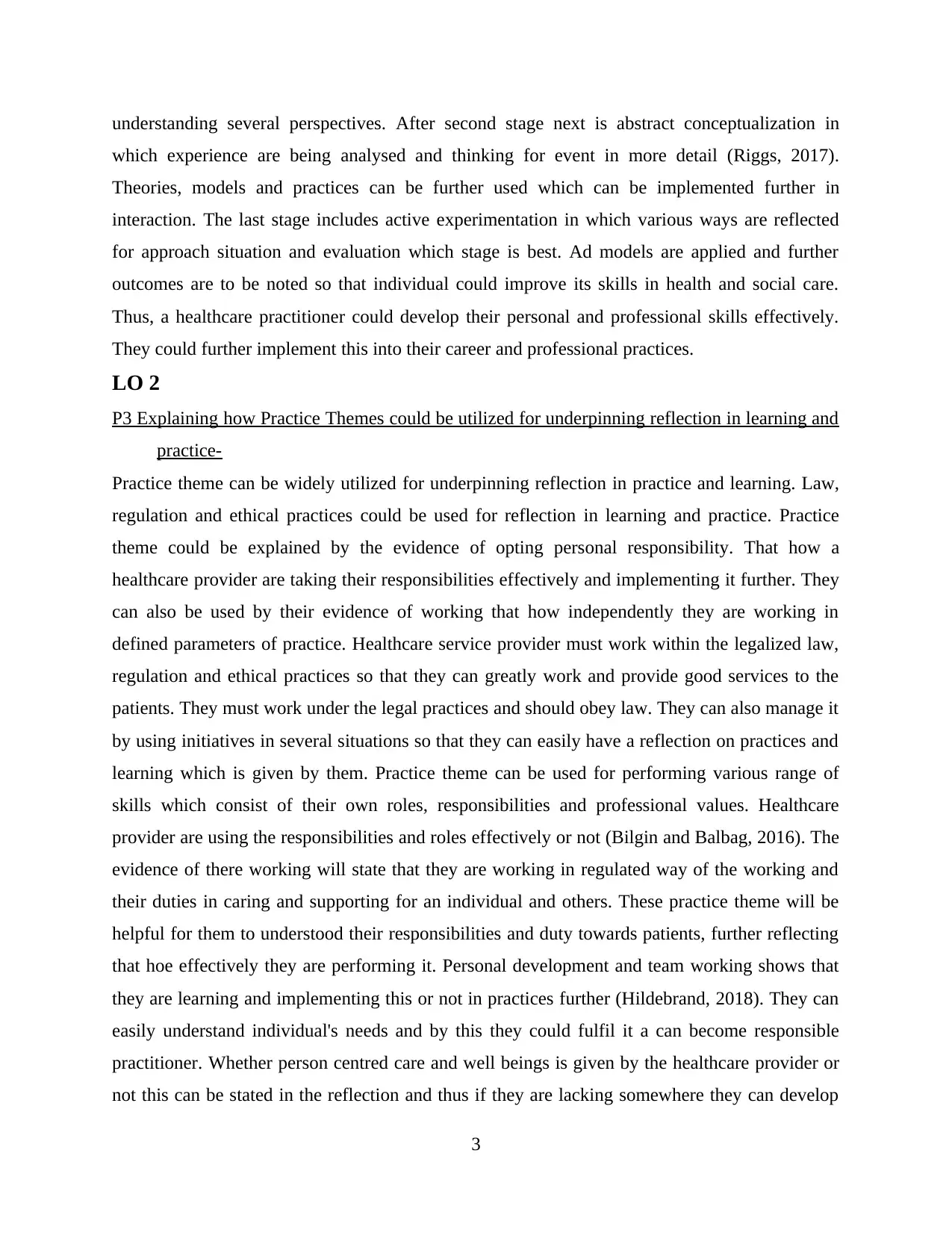
understanding several perspectives. After second stage next is abstract conceptualization in
which experience are being analysed and thinking for event in more detail (Riggs, 2017).
Theories, models and practices can be further used which can be implemented further in
interaction. The last stage includes active experimentation in which various ways are reflected
for approach situation and evaluation which stage is best. Ad models are applied and further
outcomes are to be noted so that individual could improve its skills in health and social care.
Thus, a healthcare practitioner could develop their personal and professional skills effectively.
They could further implement this into their career and professional practices.
LO 2
P3 Explaining how Practice Themes could be utilized for underpinning reflection in learning and
practice-
Practice theme can be widely utilized for underpinning reflection in practice and learning. Law,
regulation and ethical practices could be used for reflection in learning and practice. Practice
theme could be explained by the evidence of opting personal responsibility. That how a
healthcare provider are taking their responsibilities effectively and implementing it further. They
can also be used by their evidence of working that how independently they are working in
defined parameters of practice. Healthcare service provider must work within the legalized law,
regulation and ethical practices so that they can greatly work and provide good services to the
patients. They must work under the legal practices and should obey law. They can also manage it
by using initiatives in several situations so that they can easily have a reflection on practices and
learning which is given by them. Practice theme can be used for performing various range of
skills which consist of their own roles, responsibilities and professional values. Healthcare
provider are using the responsibilities and roles effectively or not (Bilgin and Balbag, 2016). The
evidence of there working will state that they are working in regulated way of the working and
their duties in caring and supporting for an individual and others. These practice theme will be
helpful for them to understood their responsibilities and duty towards patients, further reflecting
that hoe effectively they are performing it. Personal development and team working shows that
they are learning and implementing this or not in practices further (Hildebrand, 2018). They can
easily understand individual's needs and by this they could fulfil it a can become responsible
practitioner. Whether person centred care and well beings is given by the healthcare provider or
not this can be stated in the reflection and thus if they are lacking somewhere they can develop
3
which experience are being analysed and thinking for event in more detail (Riggs, 2017).
Theories, models and practices can be further used which can be implemented further in
interaction. The last stage includes active experimentation in which various ways are reflected
for approach situation and evaluation which stage is best. Ad models are applied and further
outcomes are to be noted so that individual could improve its skills in health and social care.
Thus, a healthcare practitioner could develop their personal and professional skills effectively.
They could further implement this into their career and professional practices.
LO 2
P3 Explaining how Practice Themes could be utilized for underpinning reflection in learning and
practice-
Practice theme can be widely utilized for underpinning reflection in practice and learning. Law,
regulation and ethical practices could be used for reflection in learning and practice. Practice
theme could be explained by the evidence of opting personal responsibility. That how a
healthcare provider are taking their responsibilities effectively and implementing it further. They
can also be used by their evidence of working that how independently they are working in
defined parameters of practice. Healthcare service provider must work within the legalized law,
regulation and ethical practices so that they can greatly work and provide good services to the
patients. They must work under the legal practices and should obey law. They can also manage it
by using initiatives in several situations so that they can easily have a reflection on practices and
learning which is given by them. Practice theme can be used for performing various range of
skills which consist of their own roles, responsibilities and professional values. Healthcare
provider are using the responsibilities and roles effectively or not (Bilgin and Balbag, 2016). The
evidence of there working will state that they are working in regulated way of the working and
their duties in caring and supporting for an individual and others. These practice theme will be
helpful for them to understood their responsibilities and duty towards patients, further reflecting
that hoe effectively they are performing it. Personal development and team working shows that
they are learning and implementing this or not in practices further (Hildebrand, 2018). They can
easily understand individual's needs and by this they could fulfil it a can become responsible
practitioner. Whether person centred care and well beings is given by the healthcare provider or
not this can be stated in the reflection and thus if they are lacking somewhere they can develop
3
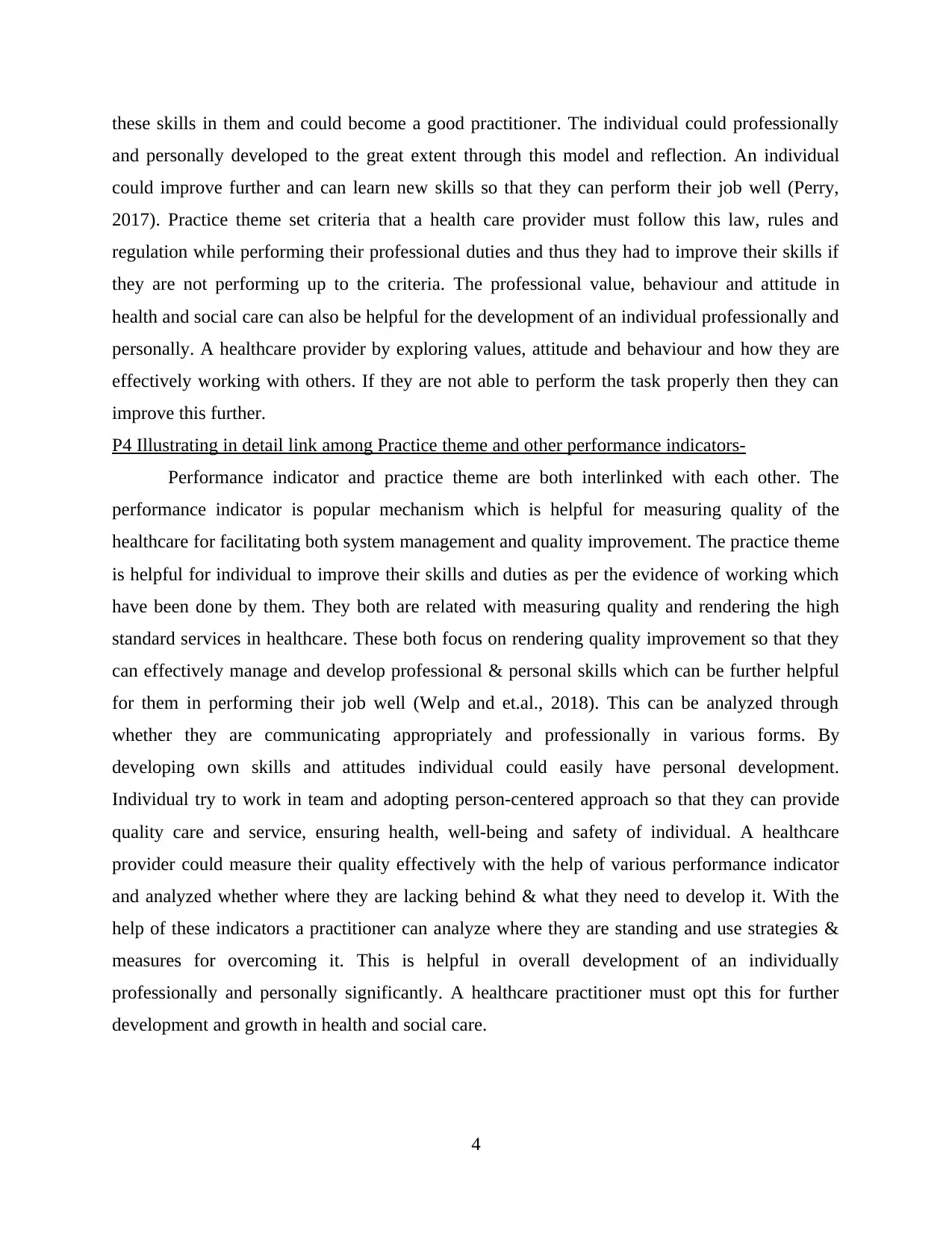
these skills in them and could become a good practitioner. The individual could professionally
and personally developed to the great extent through this model and reflection. An individual
could improve further and can learn new skills so that they can perform their job well (Perry,
2017). Practice theme set criteria that a health care provider must follow this law, rules and
regulation while performing their professional duties and thus they had to improve their skills if
they are not performing up to the criteria. The professional value, behaviour and attitude in
health and social care can also be helpful for the development of an individual professionally and
personally. A healthcare provider by exploring values, attitude and behaviour and how they are
effectively working with others. If they are not able to perform the task properly then they can
improve this further.
P4 Illustrating in detail link among Practice theme and other performance indicators-
Performance indicator and practice theme are both interlinked with each other. The
performance indicator is popular mechanism which is helpful for measuring quality of the
healthcare for facilitating both system management and quality improvement. The practice theme
is helpful for individual to improve their skills and duties as per the evidence of working which
have been done by them. They both are related with measuring quality and rendering the high
standard services in healthcare. These both focus on rendering quality improvement so that they
can effectively manage and develop professional & personal skills which can be further helpful
for them in performing their job well (Welp and et.al., 2018). This can be analyzed through
whether they are communicating appropriately and professionally in various forms. By
developing own skills and attitudes individual could easily have personal development.
Individual try to work in team and adopting person-centered approach so that they can provide
quality care and service, ensuring health, well-being and safety of individual. A healthcare
provider could measure their quality effectively with the help of various performance indicator
and analyzed whether where they are lacking behind & what they need to develop it. With the
help of these indicators a practitioner can analyze where they are standing and use strategies &
measures for overcoming it. This is helpful in overall development of an individually
professionally and personally significantly. A healthcare practitioner must opt this for further
development and growth in health and social care.
4
and personally developed to the great extent through this model and reflection. An individual
could improve further and can learn new skills so that they can perform their job well (Perry,
2017). Practice theme set criteria that a health care provider must follow this law, rules and
regulation while performing their professional duties and thus they had to improve their skills if
they are not performing up to the criteria. The professional value, behaviour and attitude in
health and social care can also be helpful for the development of an individual professionally and
personally. A healthcare provider by exploring values, attitude and behaviour and how they are
effectively working with others. If they are not able to perform the task properly then they can
improve this further.
P4 Illustrating in detail link among Practice theme and other performance indicators-
Performance indicator and practice theme are both interlinked with each other. The
performance indicator is popular mechanism which is helpful for measuring quality of the
healthcare for facilitating both system management and quality improvement. The practice theme
is helpful for individual to improve their skills and duties as per the evidence of working which
have been done by them. They both are related with measuring quality and rendering the high
standard services in healthcare. These both focus on rendering quality improvement so that they
can effectively manage and develop professional & personal skills which can be further helpful
for them in performing their job well (Welp and et.al., 2018). This can be analyzed through
whether they are communicating appropriately and professionally in various forms. By
developing own skills and attitudes individual could easily have personal development.
Individual try to work in team and adopting person-centered approach so that they can provide
quality care and service, ensuring health, well-being and safety of individual. A healthcare
provider could measure their quality effectively with the help of various performance indicator
and analyzed whether where they are lacking behind & what they need to develop it. With the
help of these indicators a practitioner can analyze where they are standing and use strategies &
measures for overcoming it. This is helpful in overall development of an individually
professionally and personally significantly. A healthcare practitioner must opt this for further
development and growth in health and social care.
4
⊘ This is a preview!⊘
Do you want full access?
Subscribe today to unlock all pages.

Trusted by 1+ million students worldwide
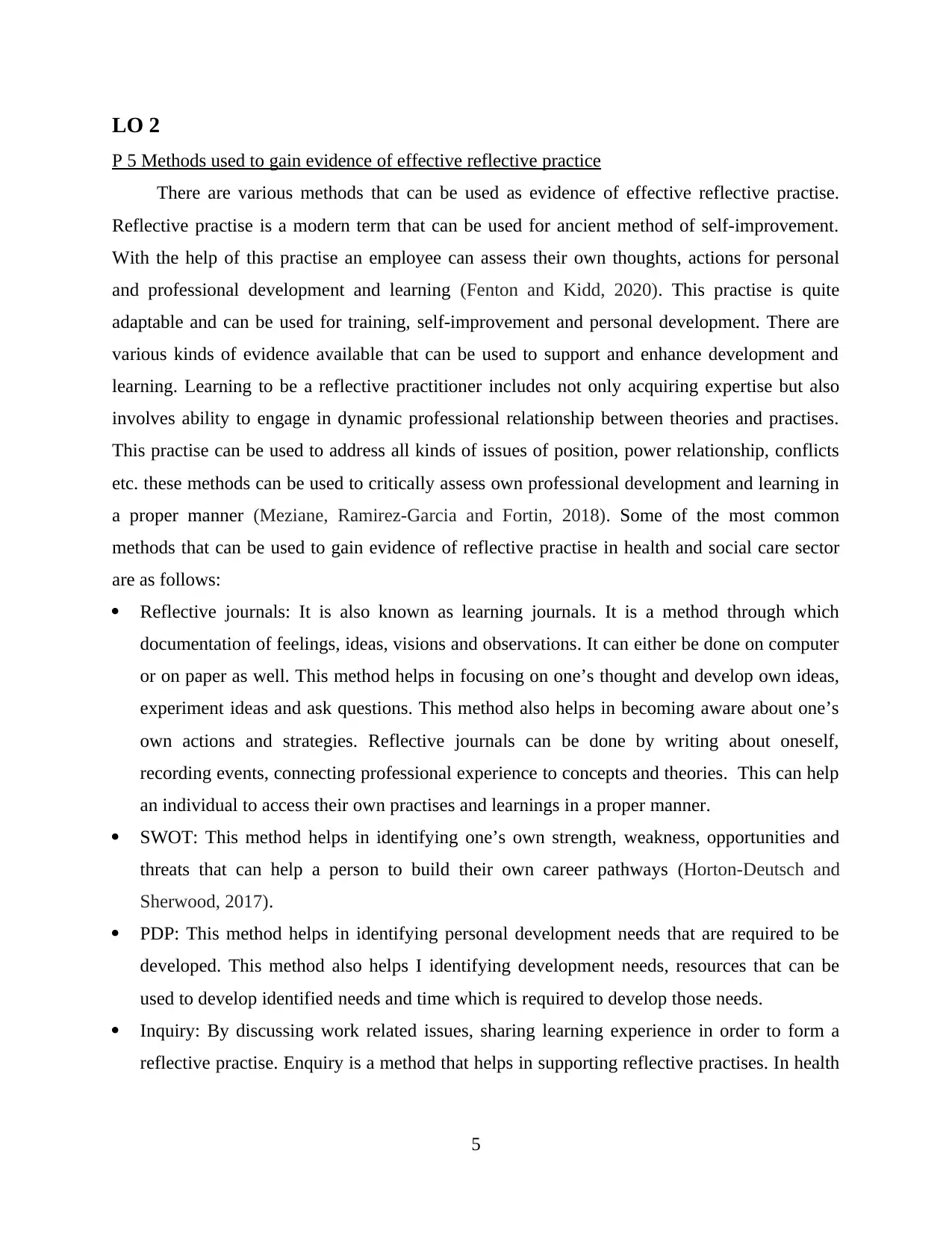
LO 2
P 5 Methods used to gain evidence of effective reflective practice
There are various methods that can be used as evidence of effective reflective practise.
Reflective practise is a modern term that can be used for ancient method of self-improvement.
With the help of this practise an employee can assess their own thoughts, actions for personal
and professional development and learning (Fenton and Kidd, 2020). This practise is quite
adaptable and can be used for training, self-improvement and personal development. There are
various kinds of evidence available that can be used to support and enhance development and
learning. Learning to be a reflective practitioner includes not only acquiring expertise but also
involves ability to engage in dynamic professional relationship between theories and practises.
This practise can be used to address all kinds of issues of position, power relationship, conflicts
etc. these methods can be used to critically assess own professional development and learning in
a proper manner (Meziane, Ramirez-Garcia and Fortin, 2018). Some of the most common
methods that can be used to gain evidence of reflective practise in health and social care sector
are as follows:
Reflective journals: It is also known as learning journals. It is a method through which
documentation of feelings, ideas, visions and observations. It can either be done on computer
or on paper as well. This method helps in focusing on one’s thought and develop own ideas,
experiment ideas and ask questions. This method also helps in becoming aware about one’s
own actions and strategies. Reflective journals can be done by writing about oneself,
recording events, connecting professional experience to concepts and theories. This can help
an individual to access their own practises and learnings in a proper manner.
SWOT: This method helps in identifying one’s own strength, weakness, opportunities and
threats that can help a person to build their own career pathways (Horton-Deutsch and
Sherwood, 2017).
PDP: This method helps in identifying personal development needs that are required to be
developed. This method also helps I identifying development needs, resources that can be
used to develop identified needs and time which is required to develop those needs.
Inquiry: By discussing work related issues, sharing learning experience in order to form a
reflective practise. Enquiry is a method that helps in supporting reflective practises. In health
5
P 5 Methods used to gain evidence of effective reflective practice
There are various methods that can be used as evidence of effective reflective practise.
Reflective practise is a modern term that can be used for ancient method of self-improvement.
With the help of this practise an employee can assess their own thoughts, actions for personal
and professional development and learning (Fenton and Kidd, 2020). This practise is quite
adaptable and can be used for training, self-improvement and personal development. There are
various kinds of evidence available that can be used to support and enhance development and
learning. Learning to be a reflective practitioner includes not only acquiring expertise but also
involves ability to engage in dynamic professional relationship between theories and practises.
This practise can be used to address all kinds of issues of position, power relationship, conflicts
etc. these methods can be used to critically assess own professional development and learning in
a proper manner (Meziane, Ramirez-Garcia and Fortin, 2018). Some of the most common
methods that can be used to gain evidence of reflective practise in health and social care sector
are as follows:
Reflective journals: It is also known as learning journals. It is a method through which
documentation of feelings, ideas, visions and observations. It can either be done on computer
or on paper as well. This method helps in focusing on one’s thought and develop own ideas,
experiment ideas and ask questions. This method also helps in becoming aware about one’s
own actions and strategies. Reflective journals can be done by writing about oneself,
recording events, connecting professional experience to concepts and theories. This can help
an individual to access their own practises and learnings in a proper manner.
SWOT: This method helps in identifying one’s own strength, weakness, opportunities and
threats that can help a person to build their own career pathways (Horton-Deutsch and
Sherwood, 2017).
PDP: This method helps in identifying personal development needs that are required to be
developed. This method also helps I identifying development needs, resources that can be
used to develop identified needs and time which is required to develop those needs.
Inquiry: By discussing work related issues, sharing learning experience in order to form a
reflective practise. Enquiry is a method that helps in supporting reflective practises. In health
5
Paraphrase This Document
Need a fresh take? Get an instant paraphrase of this document with our AI Paraphraser
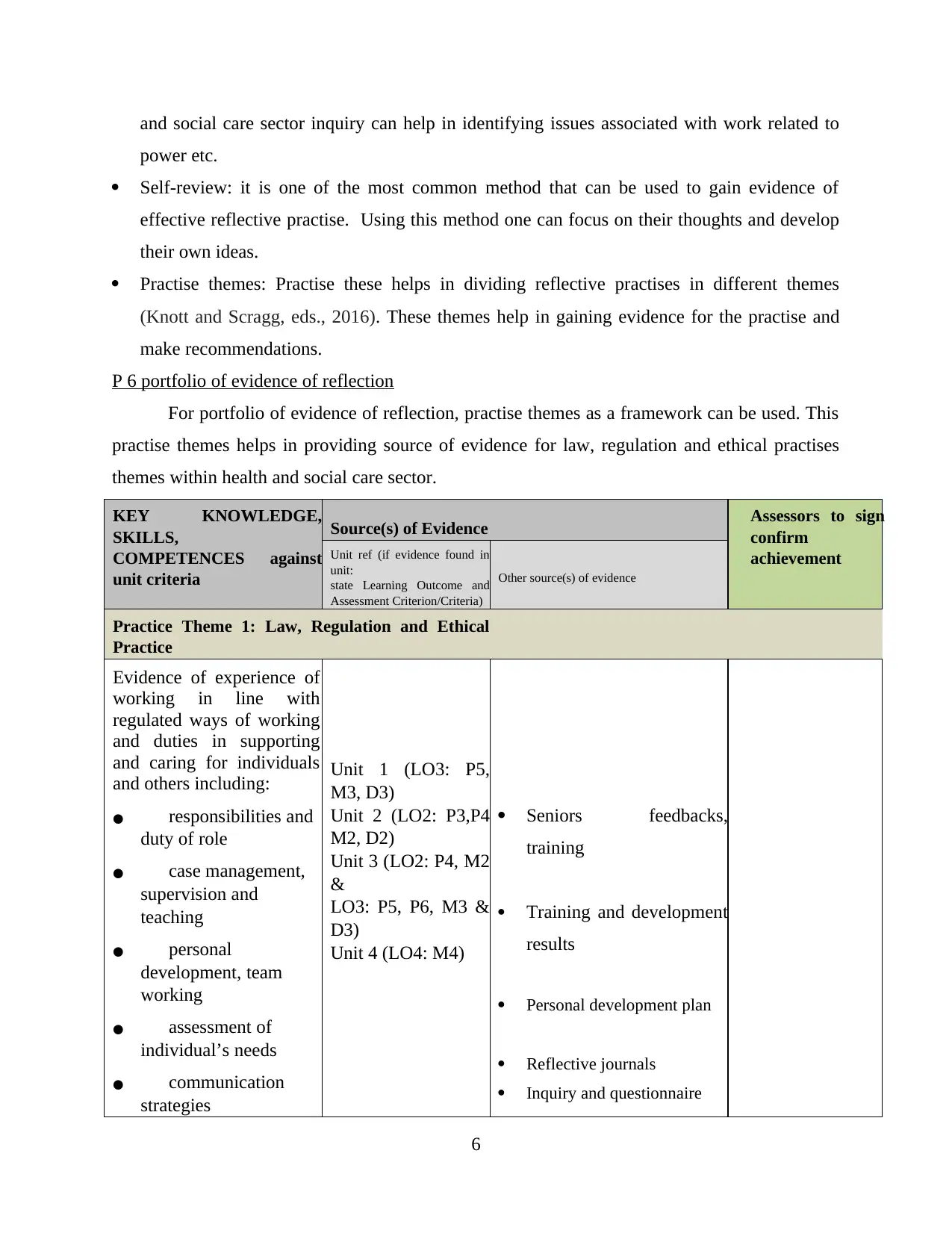
and social care sector inquiry can help in identifying issues associated with work related to
power etc.
Self-review: it is one of the most common method that can be used to gain evidence of
effective reflective practise. Using this method one can focus on their thoughts and develop
their own ideas.
Practise themes: Practise these helps in dividing reflective practises in different themes
(Knott and Scragg, eds., 2016). These themes help in gaining evidence for the practise and
make recommendations.
P 6 portfolio of evidence of reflection
For portfolio of evidence of reflection, practise themes as a framework can be used. This
practise themes helps in providing source of evidence for law, regulation and ethical practises
themes within health and social care sector.
KEY KNOWLEDGE,
SKILLS,
COMPETENCES against
unit criteria
Source(s) of Evidence Assessors to sign
confirm
achievementUnit ref (if evidence found in
unit:
state Learning Outcome and
Assessment Criterion/Criteria)
Other source(s) of evidence
Practice Theme 1: Law, Regulation and Ethical
Practice
Evidence of experience of
working in line with
regulated ways of working
and duties in supporting
and caring for individuals
and others including:
● responsibilities and
duty of role
● case management,
supervision and
teaching
● personal
development, team
working
● assessment of
individual’s needs
● communication
strategies
Unit 1 (LO3: P5,
M3, D3)
Unit 2 (LO2: P3,P4
M2, D2)
Unit 3 (LO2: P4, M2
&
LO3: P5, P6, M3 &
D3)
Unit 4 (LO4: M4)
Seniors feedbacks,
training
Training and development
results
Personal development plan
Reflective journals
Inquiry and questionnaire
6
power etc.
Self-review: it is one of the most common method that can be used to gain evidence of
effective reflective practise. Using this method one can focus on their thoughts and develop
their own ideas.
Practise themes: Practise these helps in dividing reflective practises in different themes
(Knott and Scragg, eds., 2016). These themes help in gaining evidence for the practise and
make recommendations.
P 6 portfolio of evidence of reflection
For portfolio of evidence of reflection, practise themes as a framework can be used. This
practise themes helps in providing source of evidence for law, regulation and ethical practises
themes within health and social care sector.
KEY KNOWLEDGE,
SKILLS,
COMPETENCES against
unit criteria
Source(s) of Evidence Assessors to sign
confirm
achievementUnit ref (if evidence found in
unit:
state Learning Outcome and
Assessment Criterion/Criteria)
Other source(s) of evidence
Practice Theme 1: Law, Regulation and Ethical
Practice
Evidence of experience of
working in line with
regulated ways of working
and duties in supporting
and caring for individuals
and others including:
● responsibilities and
duty of role
● case management,
supervision and
teaching
● personal
development, team
working
● assessment of
individual’s needs
● communication
strategies
Unit 1 (LO3: P5,
M3, D3)
Unit 2 (LO2: P3,P4
M2, D2)
Unit 3 (LO2: P4, M2
&
LO3: P5, P6, M3 &
D3)
Unit 4 (LO4: M4)
Seniors feedbacks,
training
Training and development
results
Personal development plan
Reflective journals
Inquiry and questionnaire
6
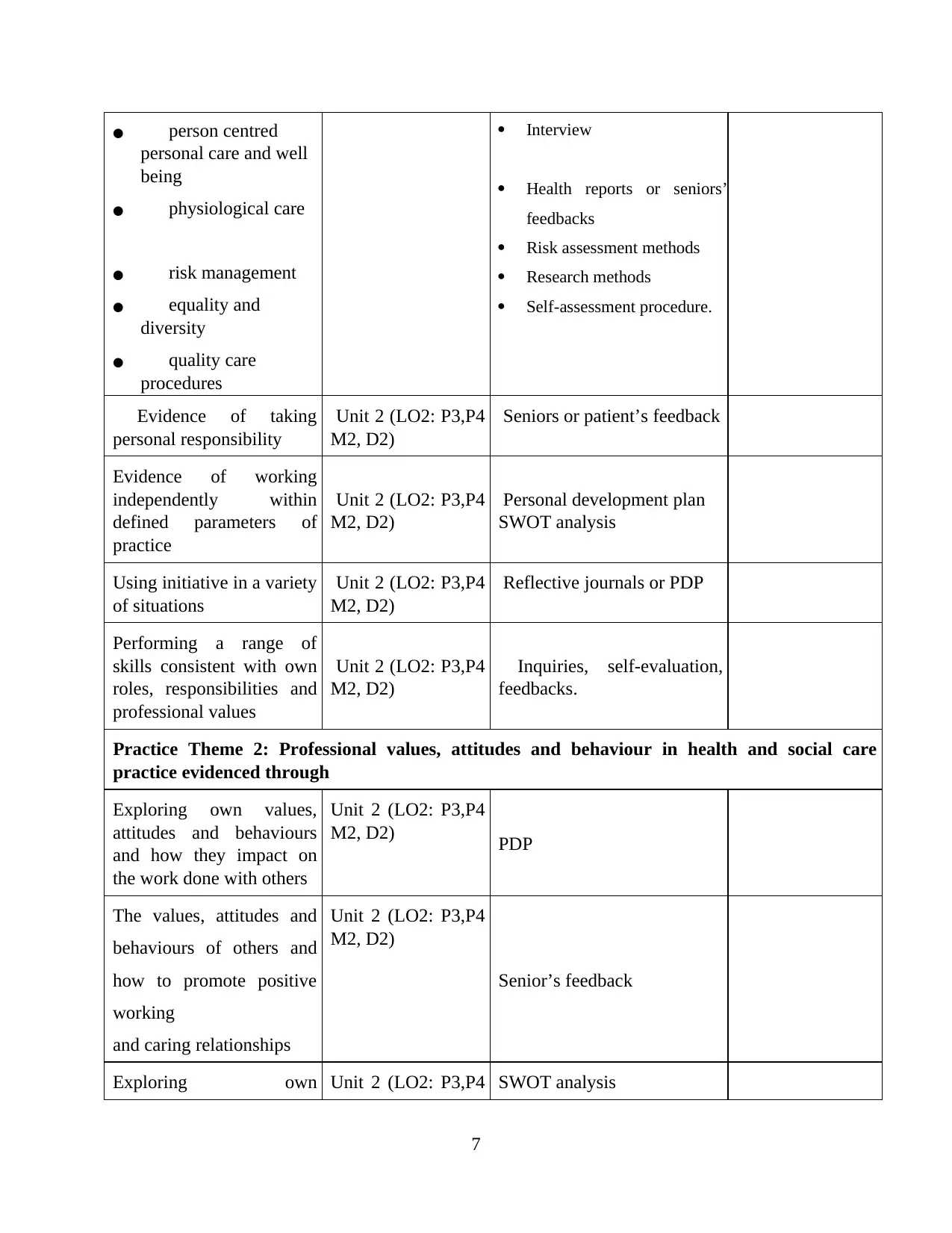
● person centred
personal care and well
being
● physiological care
● risk management
● equality and
diversity
● quality care
procedures
Interview
Health reports or seniors’
feedbacks
Risk assessment methods
Research methods
Self-assessment procedure.
Evidence of taking
personal responsibility
Unit 2 (LO2: P3,P4
M2, D2)
Seniors or patient’s feedback
Evidence of working
independently within
defined parameters of
practice
Unit 2 (LO2: P3,P4
M2, D2)
Personal development plan
SWOT analysis
Using initiative in a variety
of situations
Unit 2 (LO2: P3,P4
M2, D2)
Reflective journals or PDP
Performing a range of
skills consistent with own
roles, responsibilities and
professional values
Unit 2 (LO2: P3,P4
M2, D2)
Inquiries, self-evaluation,
feedbacks.
Practice Theme 2: Professional values, attitudes and behaviour in health and social care
practice evidenced through
Exploring own values,
attitudes and behaviours
and how they impact on
the work done with others
Unit 2 (LO2: P3,P4
M2, D2) PDP
The values, attitudes and
behaviours of others and
how to promote positive
working
and caring relationships
Unit 2 (LO2: P3,P4
M2, D2)
Senior’s feedback
Exploring own Unit 2 (LO2: P3,P4 SWOT analysis
7
personal care and well
being
● physiological care
● risk management
● equality and
diversity
● quality care
procedures
Interview
Health reports or seniors’
feedbacks
Risk assessment methods
Research methods
Self-assessment procedure.
Evidence of taking
personal responsibility
Unit 2 (LO2: P3,P4
M2, D2)
Seniors or patient’s feedback
Evidence of working
independently within
defined parameters of
practice
Unit 2 (LO2: P3,P4
M2, D2)
Personal development plan
SWOT analysis
Using initiative in a variety
of situations
Unit 2 (LO2: P3,P4
M2, D2)
Reflective journals or PDP
Performing a range of
skills consistent with own
roles, responsibilities and
professional values
Unit 2 (LO2: P3,P4
M2, D2)
Inquiries, self-evaluation,
feedbacks.
Practice Theme 2: Professional values, attitudes and behaviour in health and social care
practice evidenced through
Exploring own values,
attitudes and behaviours
and how they impact on
the work done with others
Unit 2 (LO2: P3,P4
M2, D2) PDP
The values, attitudes and
behaviours of others and
how to promote positive
working
and caring relationships
Unit 2 (LO2: P3,P4
M2, D2)
Senior’s feedback
Exploring own Unit 2 (LO2: P3,P4 SWOT analysis
7
⊘ This is a preview!⊘
Do you want full access?
Subscribe today to unlock all pages.

Trusted by 1+ million students worldwide
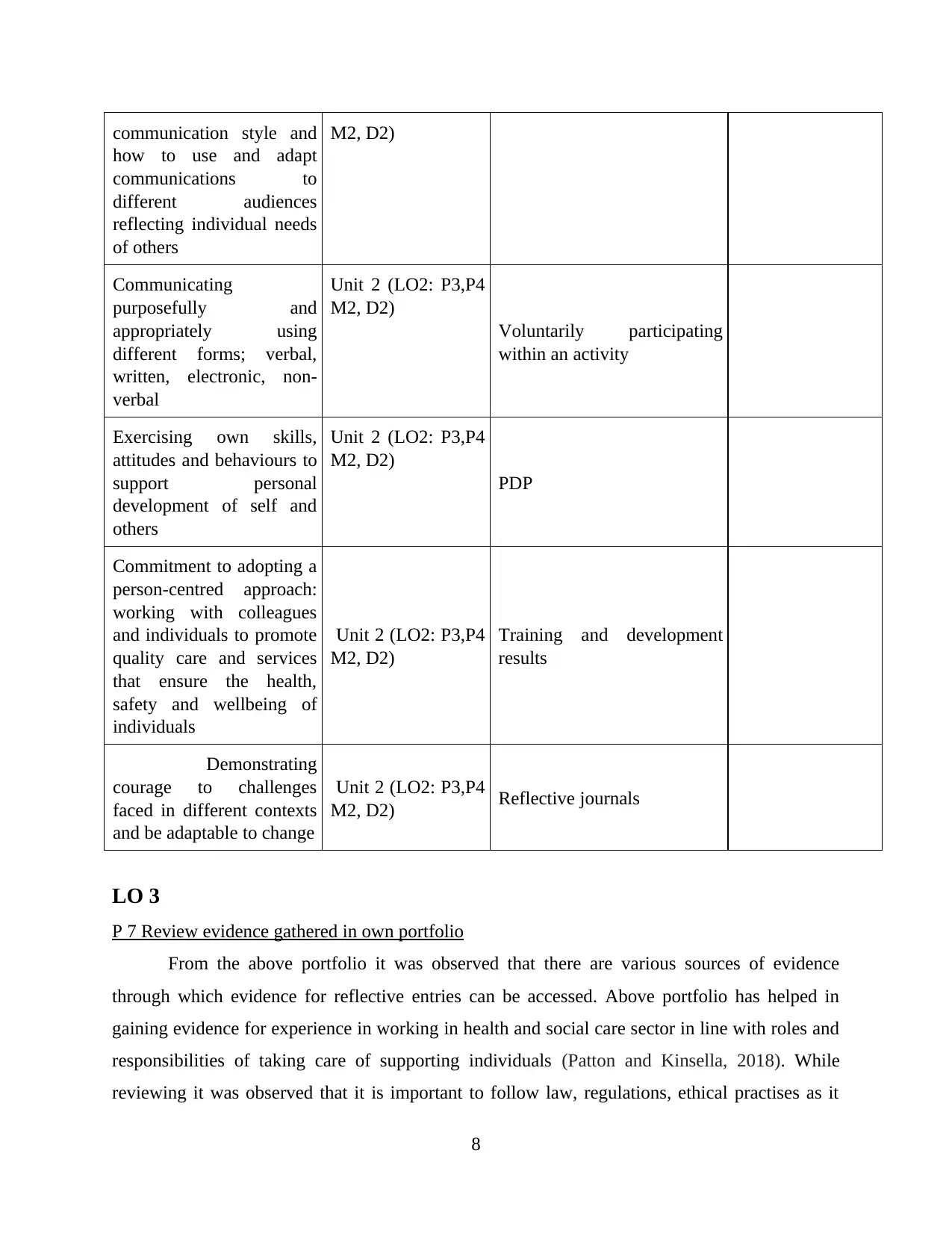
communication style and
how to use and adapt
communications to
different audiences
reflecting individual needs
of others
M2, D2)
Communicating
purposefully and
appropriately using
different forms; verbal,
written, electronic, non-
verbal
Unit 2 (LO2: P3,P4
M2, D2)
Voluntarily participating
within an activity
Exercising own skills,
attitudes and behaviours to
support personal
development of self and
others
Unit 2 (LO2: P3,P4
M2, D2)
PDP
Commitment to adopting a
person-centred approach:
working with colleagues
and individuals to promote
quality care and services
that ensure the health,
safety and wellbeing of
individuals
Unit 2 (LO2: P3,P4
M2, D2)
Training and development
results
Demonstrating
courage to challenges
faced in different contexts
and be adaptable to change
Unit 2 (LO2: P3,P4
M2, D2) Reflective journals
LO 3
P 7 Review evidence gathered in own portfolio
From the above portfolio it was observed that there are various sources of evidence
through which evidence for reflective entries can be accessed. Above portfolio has helped in
gaining evidence for experience in working in health and social care sector in line with roles and
responsibilities of taking care of supporting individuals (Patton and Kinsella, 2018). While
reviewing it was observed that it is important to follow law, regulations, ethical practises as it
8
how to use and adapt
communications to
different audiences
reflecting individual needs
of others
M2, D2)
Communicating
purposefully and
appropriately using
different forms; verbal,
written, electronic, non-
verbal
Unit 2 (LO2: P3,P4
M2, D2)
Voluntarily participating
within an activity
Exercising own skills,
attitudes and behaviours to
support personal
development of self and
others
Unit 2 (LO2: P3,P4
M2, D2)
PDP
Commitment to adopting a
person-centred approach:
working with colleagues
and individuals to promote
quality care and services
that ensure the health,
safety and wellbeing of
individuals
Unit 2 (LO2: P3,P4
M2, D2)
Training and development
results
Demonstrating
courage to challenges
faced in different contexts
and be adaptable to change
Unit 2 (LO2: P3,P4
M2, D2) Reflective journals
LO 3
P 7 Review evidence gathered in own portfolio
From the above portfolio it was observed that there are various sources of evidence
through which evidence for reflective entries can be accessed. Above portfolio has helped in
gaining evidence for experience in working in health and social care sector in line with roles and
responsibilities of taking care of supporting individuals (Patton and Kinsella, 2018). While
reviewing it was observed that it is important to follow law, regulations, ethical practises as it
8
Paraphrase This Document
Need a fresh take? Get an instant paraphrase of this document with our AI Paraphraser
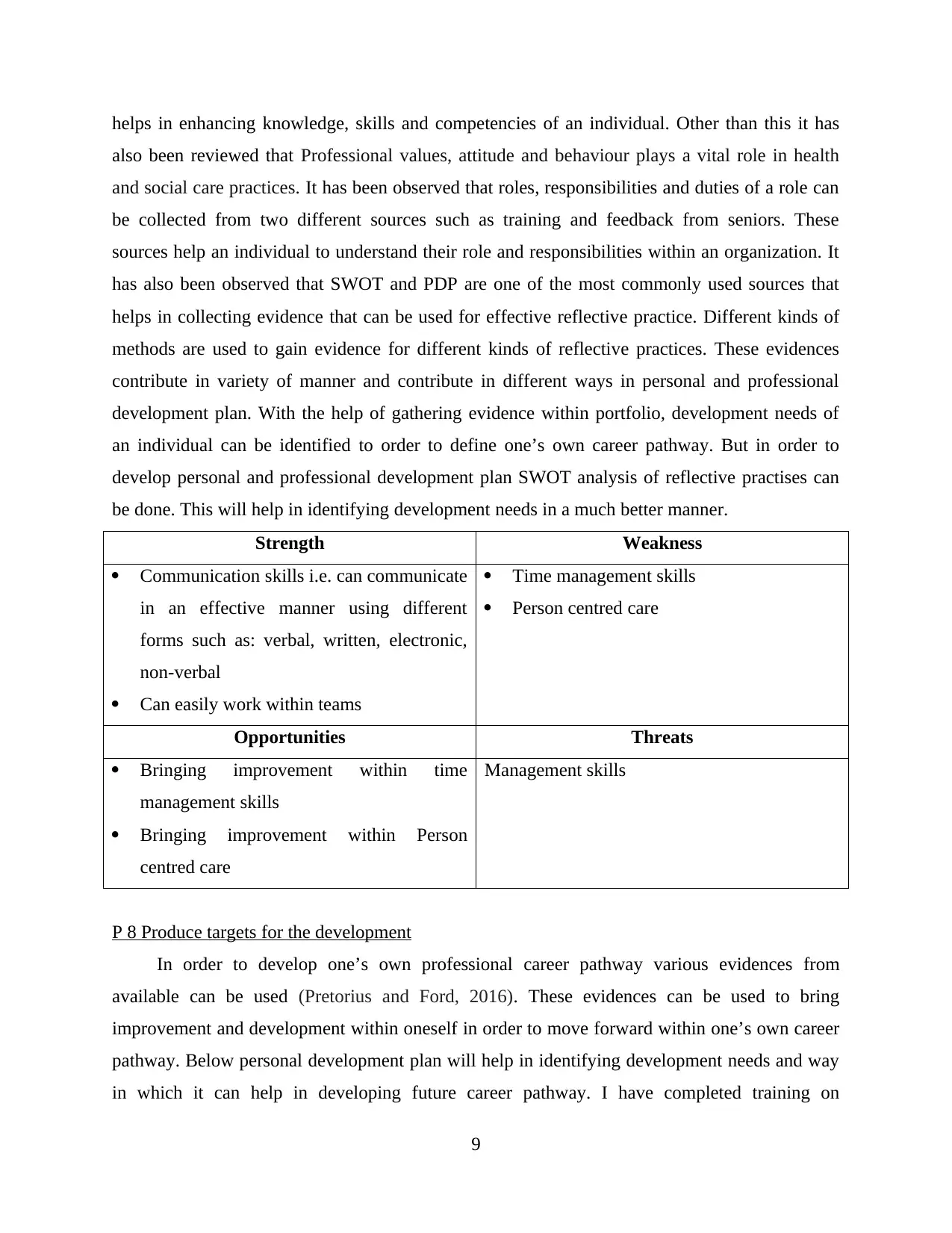
helps in enhancing knowledge, skills and competencies of an individual. Other than this it has
also been reviewed that Professional values, attitude and behaviour plays a vital role in health
and social care practices. It has been observed that roles, responsibilities and duties of a role can
be collected from two different sources such as training and feedback from seniors. These
sources help an individual to understand their role and responsibilities within an organization. It
has also been observed that SWOT and PDP are one of the most commonly used sources that
helps in collecting evidence that can be used for effective reflective practice. Different kinds of
methods are used to gain evidence for different kinds of reflective practices. These evidences
contribute in variety of manner and contribute in different ways in personal and professional
development plan. With the help of gathering evidence within portfolio, development needs of
an individual can be identified to order to define one’s own career pathway. But in order to
develop personal and professional development plan SWOT analysis of reflective practises can
be done. This will help in identifying development needs in a much better manner.
Strength Weakness
Communication skills i.e. can communicate
in an effective manner using different
forms such as: verbal, written, electronic,
non-verbal
Can easily work within teams
Time management skills
Person centred care
Opportunities Threats
Bringing improvement within time
management skills
Bringing improvement within Person
centred care
Management skills
P 8 Produce targets for the development
In order to develop one’s own professional career pathway various evidences from
available can be used (Pretorius and Ford, 2016). These evidences can be used to bring
improvement and development within oneself in order to move forward within one’s own career
pathway. Below personal development plan will help in identifying development needs and way
in which it can help in developing future career pathway. I have completed training on
9
also been reviewed that Professional values, attitude and behaviour plays a vital role in health
and social care practices. It has been observed that roles, responsibilities and duties of a role can
be collected from two different sources such as training and feedback from seniors. These
sources help an individual to understand their role and responsibilities within an organization. It
has also been observed that SWOT and PDP are one of the most commonly used sources that
helps in collecting evidence that can be used for effective reflective practice. Different kinds of
methods are used to gain evidence for different kinds of reflective practices. These evidences
contribute in variety of manner and contribute in different ways in personal and professional
development plan. With the help of gathering evidence within portfolio, development needs of
an individual can be identified to order to define one’s own career pathway. But in order to
develop personal and professional development plan SWOT analysis of reflective practises can
be done. This will help in identifying development needs in a much better manner.
Strength Weakness
Communication skills i.e. can communicate
in an effective manner using different
forms such as: verbal, written, electronic,
non-verbal
Can easily work within teams
Time management skills
Person centred care
Opportunities Threats
Bringing improvement within time
management skills
Bringing improvement within Person
centred care
Management skills
P 8 Produce targets for the development
In order to develop one’s own professional career pathway various evidences from
available can be used (Pretorius and Ford, 2016). These evidences can be used to bring
improvement and development within oneself in order to move forward within one’s own career
pathway. Below personal development plan will help in identifying development needs and way
in which it can help in developing future career pathway. I have completed training on
9

importance of reflective practises. I have identified various needs that are required to be
developed in order to develop a future career pathway. For this I have used person development
plan which will help in identifying development needs, resources required, time scale within
which these needs will be developed, achievement status and future pathway target.
Achievement of these development needs can help an individual to define their own future career
pathway within health and social care practises.
Developm
ent Needs
Specific
Objective
to achieve
Resource
s
Require
d
Times
cale
Evaluation
Measure
Achievemen
t Status
Future career
Pathway Targets
Communi
cation
skills
Be able to
communicate
with others in
order to
identify their
needs and
requirements
Training,
reflective
journals
1
month
Training
results,
senior’s
feedback Achieved
Be able to
communicate with
individuals and
identify their needs
and requirements
Managem
ent skills
Be able to
manage one’s
own and
other’s work.
attending
workshop
s
1
month
Workshop’
s results
Not
achieved
Be able to manage
own and other work
easily in order to
provide proper
services to
individuals or
groups
time
manageme
nt
Be able to
assess and
manage roles
and
responsibilitie
s in order to
enhance care
Training
and
developm
ent
programs
activates,
online
1.5
month
Online
courses
results,
feedback
from other’s
Partially
achieved
Effectively manage
roles and
responsibilities in
order to enhance
care for individuals
10
developed in order to develop a future career pathway. For this I have used person development
plan which will help in identifying development needs, resources required, time scale within
which these needs will be developed, achievement status and future pathway target.
Achievement of these development needs can help an individual to define their own future career
pathway within health and social care practises.
Developm
ent Needs
Specific
Objective
to achieve
Resource
s
Require
d
Times
cale
Evaluation
Measure
Achievemen
t Status
Future career
Pathway Targets
Communi
cation
skills
Be able to
communicate
with others in
order to
identify their
needs and
requirements
Training,
reflective
journals
1
month
Training
results,
senior’s
feedback Achieved
Be able to
communicate with
individuals and
identify their needs
and requirements
Managem
ent skills
Be able to
manage one’s
own and
other’s work.
attending
workshop
s
1
month
Workshop’
s results
Not
achieved
Be able to manage
own and other work
easily in order to
provide proper
services to
individuals or
groups
time
manageme
nt
Be able to
assess and
manage roles
and
responsibilitie
s in order to
enhance care
Training
and
developm
ent
programs
activates,
online
1.5
month
Online
courses
results,
feedback
from other’s
Partially
achieved
Effectively manage
roles and
responsibilities in
order to enhance
care for individuals
10
⊘ This is a preview!⊘
Do you want full access?
Subscribe today to unlock all pages.

Trusted by 1+ million students worldwide
1 out of 14
Related Documents
Your All-in-One AI-Powered Toolkit for Academic Success.
+13062052269
info@desklib.com
Available 24*7 on WhatsApp / Email
![[object Object]](/_next/static/media/star-bottom.7253800d.svg)
Unlock your academic potential
Copyright © 2020–2026 A2Z Services. All Rights Reserved. Developed and managed by ZUCOL.




